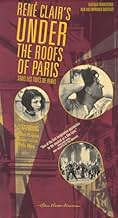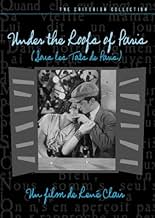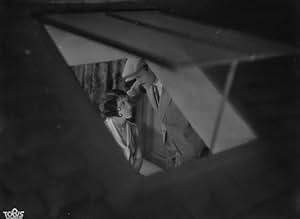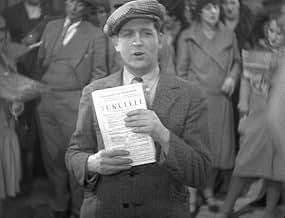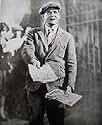Sous les toits de Paris
- 1930
- Tous publics
- 1h 36min
NOTE IMDb
7,0/10
2,6 k
MA NOTE
Albert est épris de Pola, mais se retrouve injustement emprisonné. Pendant ce temps, elle se console auprès d'un ami d'Albert, et à sa libération, l'amour et l'amitié sont mis à l'épreuve.Albert est épris de Pola, mais se retrouve injustement emprisonné. Pendant ce temps, elle se console auprès d'un ami d'Albert, et à sa libération, l'amour et l'amitié sont mis à l'épreuve.Albert est épris de Pola, mais se retrouve injustement emprisonné. Pendant ce temps, elle se console auprès d'un ami d'Albert, et à sa libération, l'amour et l'amitié sont mis à l'épreuve.
- Récompenses
- 1 victoire au total
Edmond T. Gréville
- Louis
- (as Edmond Gréville)
Delphine Abdala
- La buraliste
- (non crédité)
Raymond Aimos
- Un gars du milieu
- (non crédité)
Raymond Blot
- Un membre de la bande à Fred
- (non crédité)
Thomy Bourdelle
- François
- (non crédité)
Léon Courtois
- L'inspecteur
- (non crédité)
Édouard Francomme
- Un membre de la bande à Fred
- (non crédité)
André Michaud
- Un agent
- (non crédité)
Jane Pierson
- La dame du premier
- (non crédité)
Louis Pré Fils
- Le locataire du troisième
- (non crédité)
Eugène Stuber
- Un membre de la bande à Fred
- (non crédité)
Louis Zellas
- Le consommateur jaloux
- (non crédité)
Avis à la une
"Under the Roofs of Paris" is a film written and directed by René Clair. His direction is lovely--with some creative and lovely camera-work. As far as the story goes, it seems a bit thin.
The film begins with Pola being vigorously dated by Fred. In other words, the thug Fred isn't about to take no for an answer--and Pola is naturally creeped out by him. Ultimately, Fred steals her apartment key and Pola is understandably afraid to return home. When she bumps into Albert, he takes pity for her and takes her home. Over time, they fall for each other. However, Albert is arrested (thanks to his friend Emil) and Fred isn't about to allow Albert and Pola to be together. What's to come of them?
Technically, the film is a mixed bag--though I really cannot fault the film for its deficits. Although the film is part sound and part silent, films outside the United States took much longer to shift to all-talking pictures--so I accept that French films still were making the transition. Sound-wise, this 1930 film is very similar to 1927's "The Jazz Singer"--with a few songs and a bit of dialog but otherwise being essentially a silent film. However, what was very advanced was the camera work and the crane shots--they were very impressive and the film sure looked great.
Apart from the technical, the film had a story that seemed a bit weak. There isn't a lot of depth to the characters, they aren't necessarily likable and I didn't feel all that involved with them. So, overall, it is worth seeing but not a must-see--and not as good as some of the director's other efforts.
The film begins with Pola being vigorously dated by Fred. In other words, the thug Fred isn't about to take no for an answer--and Pola is naturally creeped out by him. Ultimately, Fred steals her apartment key and Pola is understandably afraid to return home. When she bumps into Albert, he takes pity for her and takes her home. Over time, they fall for each other. However, Albert is arrested (thanks to his friend Emil) and Fred isn't about to allow Albert and Pola to be together. What's to come of them?
Technically, the film is a mixed bag--though I really cannot fault the film for its deficits. Although the film is part sound and part silent, films outside the United States took much longer to shift to all-talking pictures--so I accept that French films still were making the transition. Sound-wise, this 1930 film is very similar to 1927's "The Jazz Singer"--with a few songs and a bit of dialog but otherwise being essentially a silent film. However, what was very advanced was the camera work and the crane shots--they were very impressive and the film sure looked great.
Apart from the technical, the film had a story that seemed a bit weak. There isn't a lot of depth to the characters, they aren't necessarily likable and I didn't feel all that involved with them. So, overall, it is worth seeing but not a must-see--and not as good as some of the director's other efforts.
I'd be lying if I said this didn't surprise me a little bit. In various ways it is, in turn, clever, novel, well done and brilliant, but also sometimes a tad uneven. René Clair's orchestration of shots and scenes as director is outstanding and often kind of ingenious, and the cinematography of Georges Périnal and Georges Raulet could hardly be more vivid and lovely; these are the first facets to catch our attention, in fact. There's also no mistaking how wonderfully crisp the image is on a basic level, and clearly this benefited from preservation efforts that some of its contemporaries didn't enjoy. It also stands out as one of the earliest sound pictures to come out of France, and more than that, Clair dallies with sound in a very playful, atypical manner - declining innate audio at many points underneath the original music, at others possibly spotlighting some sounds and not others that would coincide with action on-screen, and then still using some louder sounds to "cloak" softer ones and thus avoid the need to capture and reproduce every last one. All the while, it's certainly worth noting that 'Sous les toits de Paris' ('Under the roofs of Paris') is marvelously well made in all other regards, with sets, costume design, hair, and makeup that are utterly terrific. The sound design is perhaps imbalanced as it presents, but under the circumstances I think we can forgive the slight deficiency.
The writing is another matter in some measure. By all means, the story is compelling, and ultimately enjoyable and strongly satisfying as a viewer. Broadly speaking the scene writing, dialogue, and characters range from suitable to flesh out the tableau, to excellent. I think this suffers a bit in the details, however. As it happens, like another early French talkie released in 1930, Augusto Genina's 'Prix de beauté,' I think this title has a problem with finding the appropriate tone. 'Sous les toits de Paris' dallies with crime, romance, music, comedy, violence, and drama, and ranges from funny, to heartwarming, to inspiring, while also being unexpectedly dark and dour at new few points, including the ending. It generally seems like the feature builds strength and gels more cohesively as the runtime elapses, but the mood imparted wavers and never quite entirely feels just right. This difficulty is amplified by the peculiar directness of the storytelling, for in some cases it rather comes across that a beat or idea hasn't been meaningfully developed, and is instead just flatly introduced. When the notion of marriage is brought up, for example, it definitely doesn't seem to have received any significant treatment in the narrative, or discussion by the characters; one happily pronounces "I'm getting married," and it is just so - and the cold contrivance of such instances is exemplified in this one when their partner responds to this proclamation with a quizzical expression on their face. Suspension of disbelief takes a hit at such times.
These troubles in writing and/or execution are unfortunate, because the screenplay is mostly quite smart and solid. Clair penned a worthy, engaging tale, and everyone involved put in fine work to bring the movie to vibrant life, particularly concerning that unusual use of sound (in 1930, no less). Such quality certainly includes the cast, all giving swell performances, with Albert Préjean, Pola Illéry, and Edmond T. Gréville naturally standing out giving their prominence, but also in my opinion proving that they deserve it with the skill they demonstrate. While it's regrettable that the whole takes a while to especially come together, had the writing been tightened just a tad the end result would have benefited considerably. With all this said, though, it speaks very well to the capabilities and intelligence of all who participated in the feature's creation that it comes off as well as it does, with value that handily outweighs the weaker facets. Whatever one's impetus for watching and however one comes across 'Sous les toits de Paris' I don't think it's so essential as to fully demand viewership, but it's unquestionably deserving of recognition on its own merits. Don't necessarily feel the need to go out of your way for it, but if you have the chance to watch, this is worth exploring.
The writing is another matter in some measure. By all means, the story is compelling, and ultimately enjoyable and strongly satisfying as a viewer. Broadly speaking the scene writing, dialogue, and characters range from suitable to flesh out the tableau, to excellent. I think this suffers a bit in the details, however. As it happens, like another early French talkie released in 1930, Augusto Genina's 'Prix de beauté,' I think this title has a problem with finding the appropriate tone. 'Sous les toits de Paris' dallies with crime, romance, music, comedy, violence, and drama, and ranges from funny, to heartwarming, to inspiring, while also being unexpectedly dark and dour at new few points, including the ending. It generally seems like the feature builds strength and gels more cohesively as the runtime elapses, but the mood imparted wavers and never quite entirely feels just right. This difficulty is amplified by the peculiar directness of the storytelling, for in some cases it rather comes across that a beat or idea hasn't been meaningfully developed, and is instead just flatly introduced. When the notion of marriage is brought up, for example, it definitely doesn't seem to have received any significant treatment in the narrative, or discussion by the characters; one happily pronounces "I'm getting married," and it is just so - and the cold contrivance of such instances is exemplified in this one when their partner responds to this proclamation with a quizzical expression on their face. Suspension of disbelief takes a hit at such times.
These troubles in writing and/or execution are unfortunate, because the screenplay is mostly quite smart and solid. Clair penned a worthy, engaging tale, and everyone involved put in fine work to bring the movie to vibrant life, particularly concerning that unusual use of sound (in 1930, no less). Such quality certainly includes the cast, all giving swell performances, with Albert Préjean, Pola Illéry, and Edmond T. Gréville naturally standing out giving their prominence, but also in my opinion proving that they deserve it with the skill they demonstrate. While it's regrettable that the whole takes a while to especially come together, had the writing been tightened just a tad the end result would have benefited considerably. With all this said, though, it speaks very well to the capabilities and intelligence of all who participated in the feature's creation that it comes off as well as it does, with value that handily outweighs the weaker facets. Whatever one's impetus for watching and however one comes across 'Sous les toits de Paris' I don't think it's so essential as to fully demand viewership, but it's unquestionably deserving of recognition on its own merits. Don't necessarily feel the need to go out of your way for it, but if you have the chance to watch, this is worth exploring.
The great French film actor Jacques Tati made several films that tried to capture a Paris that disappeared even before World WarII. It was a world best seen through the gifted photography of Atget and Brassai. A world of intimacy, silent streets, virtually no traffic, limited means, but unlimited pleasures. A wonderful opening shot glides across rooftops to join a cluster of ordinary Parisians enjoying a singalong, an odd but compelling precursor of karaoke and rock concerts, but untarnished by special effects or hype. There is a sense that we are witnessing a street version of Lautrec's Moulin Rouge.
The cinematography is extraordinary. It can only be compared to Fritz Lang's "M", or the "Third Man". Very little actually happens and dialogue is used sporadically. Yet we find ourselves caring very much about the people about whom we know so little.
An unforgettable film.
The cinematography is extraordinary. It can only be compared to Fritz Lang's "M", or the "Third Man". Very little actually happens and dialogue is used sporadically. Yet we find ourselves caring very much about the people about whom we know so little.
An unforgettable film.
Having been highly impressed by "Le Million", I decided to check out Rene Clair's other acclaimed musical comedy, "Under the Roofs of Paris". I can happily assure you that this film was even better than "Le Million" in almost every single way. It amps up the heart and humor, has a much stronger emotional impact, and, while "Le Million" felt like a purely plot driven film, "Under the Roofs of Paris" balances plot and character to near perfection.
This hilarious love story unfolds slowly and steadily, introducing the audience to different characters and places without rushing everything. We watch and learn before the plot strikes us like a lightning bolt of beauty. Rene Clair's camera beautifully glides through the streets of Paris, following characters and peaking in on their most fragile moments. This film is like the finest work of literature; it contains laughs and tears, moments of melancholy and hope. It is, simply, a masterpiece.
This hilarious love story unfolds slowly and steadily, introducing the audience to different characters and places without rushing everything. We watch and learn before the plot strikes us like a lightning bolt of beauty. Rene Clair's camera beautifully glides through the streets of Paris, following characters and peaking in on their most fragile moments. This film is like the finest work of literature; it contains laughs and tears, moments of melancholy and hope. It is, simply, a masterpiece.
"Sous les toits de Paris", a 1930 comedy/drama was René Clairs first venture into sound film making - and is already a masterful showcase for the use of sound. It is actually a blend between silent movie and talking movie with whole sections being without any sound or the dialogue turned off. In its deliberate use of sound, the movie reminded me of Fritz Lang's "M".
Also, the sets are fantastic. They show the "lower" quarters of Paris as both a fantastic place and a realist place. It gives the movie a very nice touch.
But the story isn't that fantastic. It's a simplistic plot about a man falling in love. He's getting arrested. In the meantime, his best friend falls in love with his girl. I think Clair wasn't out to write something terribly new but used this simple, yet lovely story to carry his technical idea about sound (he was at that time still a strong defender of the silent cinema). Also, he wanted to show the "other" life in Paris, the low life. And he succeeds quite well at that.
All that said, however, I have to add that this isn't my kind of film. I appreciate its virtuoso style for its time, I even might consider it a classic to some extend because it led the way for a generation of film makers - but personally, it doesn't do much for me. I watch it sort of emotionless. Overall, I'd give it a very personal
6/10
Also, the sets are fantastic. They show the "lower" quarters of Paris as both a fantastic place and a realist place. It gives the movie a very nice touch.
But the story isn't that fantastic. It's a simplistic plot about a man falling in love. He's getting arrested. In the meantime, his best friend falls in love with his girl. I think Clair wasn't out to write something terribly new but used this simple, yet lovely story to carry his technical idea about sound (he was at that time still a strong defender of the silent cinema). Also, he wanted to show the "other" life in Paris, the low life. And he succeeds quite well at that.
All that said, however, I have to add that this isn't my kind of film. I appreciate its virtuoso style for its time, I even might consider it a classic to some extend because it led the way for a generation of film makers - but personally, it doesn't do much for me. I watch it sort of emotionless. Overall, I'd give it a very personal
6/10
Le saviez-vous
- AnecdotesThe opening sequence and the street scenes were filmed in a studio.
- Citations
Albert, a young street singer: [On seeing Pola bedding down on his bedroom floor] Okay, take the bed, I'll sleep on the floor.
- ConnexionsFeatured in Les dossiers de l'écran: Boulevard du crépuscule (1969)
Meilleurs choix
Connectez-vous pour évaluer et suivre la liste de favoris afin de recevoir des recommandations personnalisées
- How long is Under the Roofs of Paris?Alimenté par Alexa
Détails
- Durée
- 1h 36min(96 min)
- Couleur
Contribuer à cette page
Suggérer une modification ou ajouter du contenu manquant



